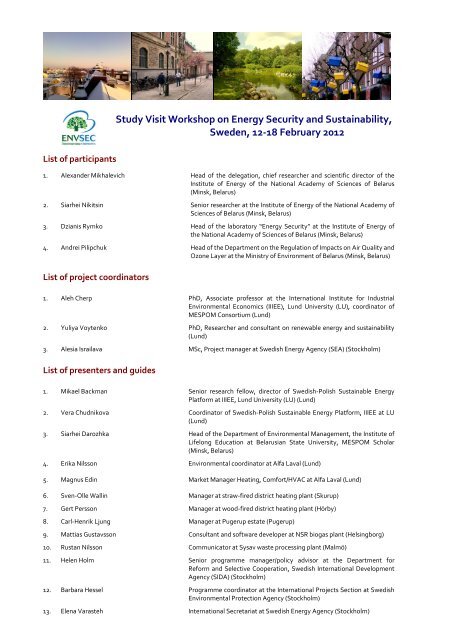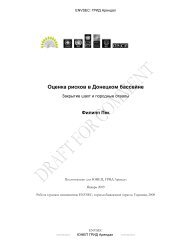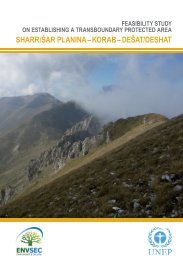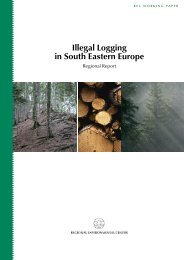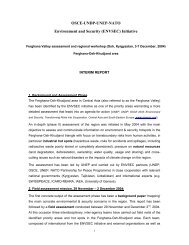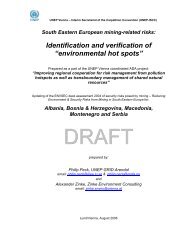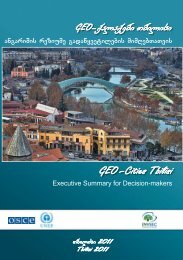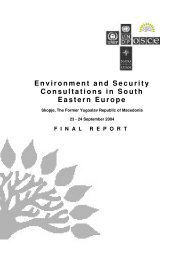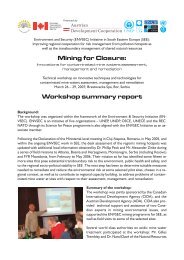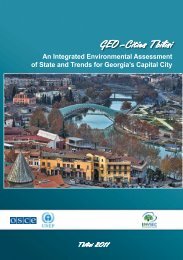Report on Study Visit Workshop - EnvSec
Report on Study Visit Workshop - EnvSec
Report on Study Visit Workshop - EnvSec
Create successful ePaper yourself
Turn your PDF publications into a flip-book with our unique Google optimized e-Paper software.
List of participants<br />
<strong>Study</strong> <strong>Visit</strong> <strong>Workshop</strong> <strong>on</strong> Energy Security and Sustainability,<br />
Sweden, 12-18 February 2012<br />
1. Alexander Mikhalevich Head of the delegati<strong>on</strong>, chief researcher and scientific director of the<br />
Institute of Energy of the Nati<strong>on</strong>al Academy of Sciences of Belarus<br />
(Minsk, Belarus)<br />
2. Siarhei Nikitsin Senior researcher at the Institute of Energy of the Nati<strong>on</strong>al Academy of<br />
Sciences of Belarus (Minsk, Belarus)<br />
3. Dzianis Rymko Head of the laboratory “Energy Security” at the Institute of Energy of<br />
the Nati<strong>on</strong>al Academy of Sciences of Belarus (Minsk, Belarus)<br />
4. Andrei Pilipchuk Head of the Department <strong>on</strong> the Regulati<strong>on</strong> of Impacts <strong>on</strong> Air Quality and<br />
Oz<strong>on</strong>e Layer at the Ministry of Envir<strong>on</strong>ment of Belarus (Minsk, Belarus)<br />
List of project coordinators<br />
1. Aleh Cherp PhD, Associate professor at the Internati<strong>on</strong>al Institute for Industrial<br />
Envir<strong>on</strong>mental Ec<strong>on</strong>omics (IIIEE), Lund University (LU), coordinator of<br />
MESPOM C<strong>on</strong>sortium (Lund)<br />
2. Yuliya Voytenko PhD, Researcher and c<strong>on</strong>sultant <strong>on</strong> renewable energy and sustainability<br />
(Lund)<br />
3. Alesia Israilava MSc, Project manager at Swedish Energy Agency (SEA) (Stockholm)<br />
List of presenters and guides<br />
1. Mikael Backman Senior research fellow, director of Swedish-Polish Sustainable Energy<br />
Platform at IIIEE, Lund University (LU) (Lund)<br />
2. Vera Chudnikova Coordinator of Swedish-Polish Sustainable Energy Platform, IIIEE at LU<br />
(Lund)<br />
3. Siarhei Darozhka Head of the Department of Envir<strong>on</strong>mental Management, the Institute of<br />
Lifel<strong>on</strong>g Educati<strong>on</strong> at Belarusian State University, MESPOM Scholar<br />
(Minsk, Belarus)<br />
4. Erika Nilss<strong>on</strong> Envir<strong>on</strong>mental coordinator at Alfa Laval (Lund)<br />
5. Magnus Edin Market Manager Heating, Comfort/HVAC at Alfa Laval (Lund)<br />
6. Sven-Olle Wallin Manager at straw-fired district heating plant (Skurup)<br />
7. Gert Perss<strong>on</strong> Manager at wood-fired district heating plant (Hörby)<br />
8. Carl-Henrik Ljung Manager at Pugerup estate (Pugerup)<br />
9. Mattias Gustavss<strong>on</strong> C<strong>on</strong>sultant and software developer at NSR biogas plant (Helsingborg)<br />
10. Rustan Nilss<strong>on</strong> Communicator at Sysav waste processing plant (Malmö)<br />
11. Helen Holm Senior programme manager/policy advisor at the Department for<br />
Reform and Selective Cooperati<strong>on</strong>, Swedish Internati<strong>on</strong>al Development<br />
Agency (SIDA) (Stockholm)<br />
12. Barbara Hessel Programme coordinator at the Internati<strong>on</strong>al Projects Secti<strong>on</strong> at Swedish<br />
Envir<strong>on</strong>mental Protecti<strong>on</strong> Agency (Stockholm)<br />
13. Elena Varasteh Internati<strong>on</strong>al Secretariat at Swedish Energy Agency (Stockholm)
<strong>Study</strong> <strong>Visit</strong> <strong>Workshop</strong> <strong>on</strong> Energy Security and Sustainability. Sweden, 12-18 February 2012<br />
Programme<br />
12 February 2012<br />
14:25 / 16:10 Arrival at the airport in Copenhagen. Transfer to Lund. Checking in at Duxiana Hotel.<br />
13 February 2012<br />
09:00-11:30 <strong>Study</strong> visit to the Internati<strong>on</strong>al Institute of Industrial Envir<strong>on</strong>mental Ec<strong>on</strong>omics<br />
(IIIEE). Meeting IIIEE researchers.<br />
11:30-11:50 M<strong>on</strong>ey exchange (opti<strong>on</strong>al)<br />
12:00-13:00 Lunch at the restaurant Kulturkrogen, Lund<br />
13:30-15:30 <strong>Study</strong> visit to Lunds Energi combined heat and power (CHP) plant in Lund<br />
16:00-17:30 <strong>Study</strong> visit to Alfa Laval, Lund<br />
18:30-21:00 Joint dinner at the restaurant Carlss<strong>on</strong>s Trädgård, Lund<br />
14 February 2012<br />
09:00 Departure from the hotel by car<br />
10:00-11:00 <strong>Study</strong> visit to the district heating plant in Skurup that uses straw and wood pellets for<br />
energy producti<strong>on</strong><br />
12:00-13:00 Lunch at the restaurant Myntha in Lund. Departure from the IIIEE at 13:05<br />
14:00-15:00 <strong>Study</strong> visit to Hörby district heating plant that uses wood chips for energy producti<strong>on</strong><br />
15:30-16:30 <strong>Study</strong> visit to Pugerup estate with attendance of a straw-fired boiler that produces<br />
heat for the estate and of wind mills for electricity producti<strong>on</strong><br />
17:00-18:00 <strong>Study</strong> visit to the castle and estate in Bosjökloster. Trip around Bosjökloster.<br />
Examples of energy saving measures in rural houses<br />
18:00 Return to Lund by train<br />
15 February 2012<br />
10:00-11:30 <strong>Study</strong> visit to NSR biogas plant in Helsingborg<br />
12:30 Lunch in Lund or Malmö<br />
14:00-15:30 <strong>Study</strong> visit to SYSAV waste processing plant in Malmö<br />
From 15:30 Free time in Malmö<br />
16 February 2012<br />
11:05 Arrival in Stockholm. Transfer to the city. Check in at C<strong>on</strong>nect Hotel City<br />
12:30 Lunch at the restaurant Big Beef<br />
15:00 <strong>Study</strong> visit to Swedish Internati<strong>on</strong>al Development Cooperati<strong>on</strong> Agency (SIDA)<br />
17 February 2012<br />
10:30-12:00 <strong>Study</strong> visit to Swedish Energy Agency<br />
12:30-13:30 Lunch at the restaurant Rosen<br />
From 13:30 Free time in Stockholm<br />
18 February 2012<br />
7:00 Departure to the airport in Stockholm and return to Minsk<br />
2
<strong>Study</strong> <strong>Visit</strong> <strong>Workshop</strong> <strong>on</strong> Energy Security and Sustainability. Sweden, 12-18 February 2012<br />
Day 1: M<strong>on</strong>day, 13 February 2012<br />
Part 1: Scania (Southern Sweden)<br />
Venue: Internati<strong>on</strong>al Institute for Industrial Envir<strong>on</strong>mental Ec<strong>on</strong>omics (IIIEE) at Lund University (LU) and Alfa<br />
Laval company, Lund, Sweden<br />
Day 1 started with welcoming of the participants at the IIIEE by Aleh Cherp and Yuliya Voytenko followed by a<br />
roundtable with Mikael Backman, Vera Chudnikova and Siarhei Darozhka. The morning sessi<strong>on</strong> included brief<br />
pers<strong>on</strong>al presentati<strong>on</strong>s by the workshop participants, coordinators and IIIEE representatives of their<br />
professi<strong>on</strong>al background, experience and interests. The discussi<strong>on</strong>s touched up<strong>on</strong> the comparis<strong>on</strong> of Swedish<br />
and Belarusian c<strong>on</strong>texts (e.g. development trends, policy envir<strong>on</strong>ment, private and public initiatives, case<br />
study examples) in the area of sustainable energy producti<strong>on</strong> for heating, electricity and transportati<strong>on</strong>.<br />
Mikael Backman and Vera Chudnikova presented Swedish-Polish Sustainable Energy Platform, which is created<br />
at the IIIEE <strong>on</strong> the cooperati<strong>on</strong> with the Divisi<strong>on</strong> for Fuels and Renewable Energy at the Automotive Industry<br />
Institute (PIMOT), the Embassy of the Republic of Poland in Stockholm and the Embassy of the Kingdom of<br />
Sweden in Warsaw. Its purpose is to promote and disseminate technology and knowledge <strong>on</strong> sustainable<br />
energy technologies (i.e. renewable energy and energy efficiency), facilitate compliance with the EU climate<br />
and energy package as well as to link Polish and Swedish sustainable energy activities and business partners.<br />
A study visit to Lund Energy was cancelled the same day by Martin Gierow, a manager at Lund Energy<br />
resp<strong>on</strong>sible for the study visit, due to Mr. Gierow’s health c<strong>on</strong>diti<strong>on</strong>. Thus it was substituted with an afterno<strong>on</strong><br />
sessi<strong>on</strong>, where Yuliya Voytenko delivered the following presentati<strong>on</strong>s to the workshop participants:<br />
1) Transport and Climate in Lund, Sweden (original presentati<strong>on</strong> by Anders Söderberg, Mobility<br />
Management Coordinator at the City of Lund);<br />
2) Cycle Planning in Malmö (original presentati<strong>on</strong> and photos by Olle Evenäs, Traffic Planner at Streets<br />
and Parks Department at the City of Malmö)<br />
3) Lunds Energi K<strong>on</strong>cernen. Kraftringen Produkti<strong>on</strong> (original presentati<strong>on</strong> by Martin Gierow, Manager at<br />
Lund Energy company)<br />
The presentati<strong>on</strong>s followed with a discussi<strong>on</strong> by the workshop participants and coordinators.<br />
Day 1 finished with a study visit to the company of Alfa Laval in Lund. The study visit started with the<br />
presentati<strong>on</strong> of the company and its products by Erika Nilss<strong>on</strong> as well as the energy efficiency programme that<br />
Alfa Laval has introduced in their activities. Magnus Edin complemented the presentati<strong>on</strong> with Alfa Laval<br />
business descripti<strong>on</strong> in Eastern Europe (e.g. provided an example of the project <strong>on</strong> the modernisati<strong>on</strong> of<br />
central district heating system in Odessa (Ukraine), which was carried out by Alfa Laval). Later the participants<br />
of the workshop were guided to Alfa Laval plant, where they could see the producti<strong>on</strong> processes of heat<br />
exchanger plates and assembly lines for the heat exchangers, and ask further questi<strong>on</strong>s from Erika Nilss<strong>on</strong>.<br />
Day 2: Tuesday, 14 February 2012<br />
Venue: Skurup, Hörby, Pugerup and Bosjökloster, Sweden<br />
Day 2 started with a study visit to Skurups Fjärrvärme AB - a 5 MW straw-fired district heating (DH) plant in the<br />
village of Skurup, Scania. The plant is owned by the Swedish group of agricultural producers Lantmännen AB.<br />
It supplies DH and hot water to the majority of houses in the village. The plant has also two reserve oil boilers –<br />
3 and 8 MW – and a newly c<strong>on</strong>structed wood pellet boiler of 3 MW that was put in operati<strong>on</strong> in November 2010.<br />
DH plant in Skurup was c<strong>on</strong>structed as a result of the municipality interest to utilise abundant amount of straw<br />
in the regi<strong>on</strong> and produce energy locally and in a more sustainable way.<br />
Day 2 c<strong>on</strong>tinued with a study tour to the village of Hörby, where the company Rindi Energi AB has installed a<br />
6 MW DH plant and supplies heat and hot water to private, municipal and industrial users in the village. The<br />
boiler uses wood chips in its operati<strong>on</strong>, which are supplied to the plant from the forestry companies in a close<br />
proximity. The plant has two reserve oil-fired boilers – 8 and 3 MW – which are used when the heat demand is<br />
3
<strong>Study</strong> <strong>Visit</strong> <strong>Workshop</strong> <strong>on</strong> Energy Security and Sustainability. Sweden, 12-18 February 2012<br />
especially high in cold seas<strong>on</strong>s of the year. Rindi Energi AB is a private company that is operating 11 small scale<br />
DH systems, which are similar to the <strong>on</strong>e in Hörby, in other regi<strong>on</strong>s of Sweden.<br />
The next study visit was carried out to the farm estate Pugerup. Its size is around 1500 ha, 1100 ha of which are<br />
used for growing crops. Significant areas are also covered with forest. The farm has its own straw-fired boiler<br />
of 600 kW from 2003, which utilises the farm’s own straw resources and is used for its heating needs (e. g., to<br />
run a grain dryer, to warm up houses, administrative buildings and pig breeding facilities). Straw is ignited with<br />
natural gas and is the main fuel for the boiler. However, sometimes wood chips and other combustible<br />
substances are added to the boiler. Pugerup estate also owns several wind turbines, and sells the electricity to<br />
the Nordic Electricity Grid (Nord Pool). The workshop participants attended the straw-fired boiler, the grain<br />
dryer and <strong>on</strong>e of the wind turbines.<br />
Day 2 closed with a study visit to Bosjökloster estate. <strong>Workshop</strong> participants were dem<strong>on</strong>strated energy<br />
efficiency measures in a rural house (i.e. a heat pump that uses the heat from a nearby lake to heat the house<br />
and smart energy meters) as well as had a guided tour around the castle and the territory of Bosjökloster<br />
estate.<br />
Day 3: Wednesday, 15 February 2012<br />
Venue: Helsingborg and Malmö, Sweden<br />
Day 3 started with a study visit to NSR biogas plant in the city of Helsingborg. The plant began its operati<strong>on</strong> in<br />
1996, is 52% municipally owned, and produces about 4 milli<strong>on</strong> m 3 of biogas per year. The raw material for the<br />
biogas c<strong>on</strong>sists of by-products from the food industry, liquid manure and sorted household waste. The<br />
fermentati<strong>on</strong> process results in raw gas, c<strong>on</strong>sisting of methane and carb<strong>on</strong> dioxide, which is then upgraded to<br />
vehicle fuel in two upgrading units that remove the carb<strong>on</strong> dioxide. The upgraded gas c<strong>on</strong>sists by 97-98% of<br />
methane. The biogas is used for the transportati<strong>on</strong> (both public and private) as well as for the combined heat<br />
and power producti<strong>on</strong> in Helsingborg. The remains from the digesti<strong>on</strong> process are used as a certified biological<br />
fertiliser and distributed to the nearby farms through a pipeline.<br />
Day 3 c<strong>on</strong>tinued with a study visit to SYSAV waste processing plant in Malmö, which produces energy from the<br />
waste of households, industries and recycling stati<strong>on</strong>s as well as sells the recycled waste to industries and<br />
recycled organic waste to the agricultural enterprises. Today about 90% of all waste that is delivered to SYSAV<br />
is recycled either in the form of energy or materials while 10% is landfilled <strong>on</strong> the territory of the plant. The<br />
plant’s target is to perform 100% waste recycling. The burning takes place at 1000ºC. The cleaning of flue<br />
gases involves several stages. First, the dust is eliminated in an electric filter. Then the flue gases are cleaned<br />
using water in three different cleaning processes, and are later cleaned in a wet electric filter. A catalyst is used<br />
in the final step of the flue gas treatment prior to emitting the smoke through a 100 m high stack. The wasteto-energy<br />
plant produces about 250 GWh of electricity and 1400 GWh of heat annually. SYSAV plant currently<br />
delivers over 60% of the district heating to Malmö and Burlöv municipalities.<br />
Day 4: Thursday, 16 February 2012<br />
Venue: Stockholm, Sweden<br />
Part 2: Stockholm<br />
On the morning of Day 4 workshop participants were transferred to Stockholm accompanied by Yuliya<br />
Voytenko. In the afterno<strong>on</strong> of Day 4 they attended Swedish Internati<strong>on</strong>al Development Cooperati<strong>on</strong> Agency<br />
(SIDA). First a presentati<strong>on</strong> was delivered by Helen Holm, who is resp<strong>on</strong>sible for the envir<strong>on</strong>ment related<br />
cooperati<strong>on</strong> in Belarus, Ukraine, Moldova and Georgia. Her presentati<strong>on</strong> was complemented by a presentati<strong>on</strong><br />
from Barbara Hessel, who is coordinating Belarusian programme at Swedish Envir<strong>on</strong>ment Protecti<strong>on</strong> Agency<br />
(EPA), which is funded by SIDA. In particular, Barbara Hessel informed the workshop participants about five<br />
waste management projects that are carried out by Swedish EPA in Belarus at the moment. The presentati<strong>on</strong>s<br />
ended up with the discussi<strong>on</strong> between workshop participants and presenters about potential cooperati<strong>on</strong> and<br />
funding opportunities.<br />
4
<strong>Study</strong> <strong>Visit</strong> <strong>Workshop</strong> <strong>on</strong> Energy Security and Sustainability. Sweden, 12-18 February 2012<br />
Day 5: Friday, 17 February 2012<br />
Venue: Stockholm, Sweden<br />
On Day 5 the workshop participants attended Swedish Energy Agency (SEA), where Elena Varasteh delivered a<br />
presentati<strong>on</strong> <strong>on</strong> Sustainable Energy System and Energy Efficiency in Sweden. In her presentati<strong>on</strong> Elena Varasteh<br />
introduced the resp<strong>on</strong>sibilities, functi<strong>on</strong>s and the role of SEA (e.g., in electricity certificates, emissi<strong>on</strong> trading<br />
schemes, knowledge support for industrial enterprises, nati<strong>on</strong>al energy statistics etc.), existing mechanisms to<br />
support renewable energy sources and energy efficiency measures in Sweden and case studies <strong>on</strong> sustainable<br />
housing in Sweden. The discussi<strong>on</strong> followed the presentati<strong>on</strong>. The representative of the Ministry of the<br />
Envir<strong>on</strong>ment of Belarus left a list of his questi<strong>on</strong>s <strong>on</strong> policy mechanisms and their development to Elena<br />
Varasteh, while she promised to look into the opportunities to organise a follow up seminar with the<br />
involvement of relevant experts, if the workshop participants come with another visit to Sweden. Elena<br />
Varasteh has recommended to c<strong>on</strong>tact Belarusian representative at the European Commissi<strong>on</strong> as well as to<br />
explore the activities of Energik<strong>on</strong>toret Skåne (a Scanian Unit within the Associati<strong>on</strong> of Swedish Regi<strong>on</strong>al<br />
Energy Offices - www.fsek.se), which may be c<strong>on</strong>sidering the development of relati<strong>on</strong>s with Belarus in the<br />
energy sector.<br />
Major Outcomes and Feedback by the Participants<br />
1. Swedish-Polish Sustainable Energy Platform at IIIEE could be used as an inspiring example to create a<br />
similar technology and knowledge exchange platform between Sweden and Belarus or Sweden and<br />
transiti<strong>on</strong> ec<strong>on</strong>omies in Eastern Europe.<br />
2. Alexander Mikhalevich has suggested to SIDA and SEA a possibility to financially support the<br />
c<strong>on</strong>tinuati<strong>on</strong> of the Internati<strong>on</strong>al Expert Seminar <strong>on</strong> Renewable Energy for Eastern Europe in 2013.<br />
Such first seminar was held in 2011 in Minsk with the support from UNESCO and IRENA.<br />
3. The Institute of Energy in Belarus and Yuliya Voytenko have agreed about potential cooperati<strong>on</strong> in the<br />
future calls for research/collaborative proposals for funding <strong>on</strong> sustainable energy related topics<br />
between Sweden and Eastern Europe.<br />
4. An advise from SEA representative Elena Varasteh was to explore the activities of Energik<strong>on</strong>toret<br />
Skåne (Scanian Unit within the Associati<strong>on</strong> of Swedish Regi<strong>on</strong>al Energy Offices - www.fsek.se), which<br />
might be c<strong>on</strong>sidering the development of relati<strong>on</strong>s with Belarus in the energy sector.<br />
5. One of the major c<strong>on</strong>clusi<strong>on</strong>s drawn by the participants was the identificati<strong>on</strong> of <strong>on</strong>e main difference in<br />
the emergence of sustainable energy practices in Sweden and Belarus. While in Belarus the approach is<br />
essentially top down, and the government is expected by other stakeholders to impose ‘carrots’ and<br />
‘sticks’ to encourage the development and proliferati<strong>on</strong> of sustainable energy systems, in Sweden<br />
many initiatives emerge at the bottom level (e.g. community or private), and are in many cases <strong>on</strong>ly<br />
generally guided by the state policies.<br />
6. One of the further wishes by the participants from the Institute of Energy is to organize a follow up<br />
seminar that will involve the explorati<strong>on</strong> of how sustainable development c<strong>on</strong>cept is<br />
measured/understood in Sweden in reality (e.g. what is perceived as ‘a sustainable district’, ‘a<br />
sustainable regi<strong>on</strong>’ or ‘a sustainable energy system’ by municipalities, businesses and other actors).<br />
7. One of the further wishes by the representative of the Ministry of Envir<strong>on</strong>ment of Belarus is to organise<br />
a short course of lectures by Swedish energy experts (e.g. representatives of academia, policy makers<br />
at different levels, business actors etc.), who can explain the nature of energy policy making process<br />
(e.g. how the policy instruments supporting sustainable energy are developed, implemented and<br />
enforced). A preliminary support of such activity was dem<strong>on</strong>strated by Elena Varasteh from SEA.<br />
8. The overall level of satisfacti<strong>on</strong> by the workshop by its participants and the organizati<strong>on</strong>al skills of the<br />
workshop coordinators can be recorded as very high.<br />
This <strong>Study</strong> <strong>Visit</strong> <strong>Workshop</strong> was supported by the Envir<strong>on</strong>ment and Security (ENVSEC) Initiative<br />
(http://www.envsec.org).<br />
5


